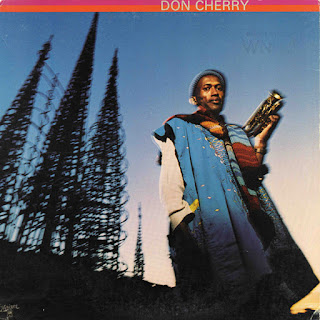 |
| Spiritual | Avant-garde Jazz | Fusion Listen Link | mp3 | 320 Kbps
Don Cherry (trumpet, electric piano and vocals), Frank Lowe (saxophone), Ricky Cherry (piano and electric piano), Charlie Haden (bass), Billy Higgins (drums), Bunchie Fox (bongos on "Brown Rice"), Verna Gillis (vocals on "Brown Rice"), Moki Cherry (tanpura on "Malkauns") and Hakim Jami (bass on "Chenrezig")
|
Don Cherry's self-titled album (also known as Brown Rice on later reissues) is one of the pinnacles of his career, even when his works with Ornette Coleman are taken into account. With only four songs, it constitutes a true journey, one of Don's masterpieces.
"Brown Rice", the album opener, is psychedelic, catchy, hypnotic; it sounds almost like psych-folk/drone from the past decade. The bass fuzz is brilliant, and Don's cryptic vocals and Verna Gillis's incessant oniric chant submerge you into an unparalleled trance, to which Billy Higgins and Bunchie Fox's percussions (Higgins was a close friend of Cherry and his bandmate in The Ornette Coleman Quartet) certainly contribute.
In contrast to the dancing voluptuosity of "Brown Rice", the second track of the album, "Malkauns", shows greater timidity right off the bat. Charlie Haden's (another legendary musician, who was part of Coleman's classic quartet too) bass intro, acompannied by Moki Cherry's (Don's wife) tanpura, helps establish an introspective, melancholic and somewhat bleak atmosphere, on the top of which Don weaves a trumpet improsation that confirms the song's rather sad tone, but with a cheerful, cathartic, liberating melancholy. Per Higgins's drums, the atmosphere progressively transmits more confidence, more safeness; the feeling that life is sad sometimes, but things will be alright. Beautiful song.
For its part, "Chenrezig" deepens more directly into the Eastern influences of Cherry's music. Don's vocals virtually turn into throat singing, building a cryptic environment which opens up slowly. Later on, a more traditional jazz element comes into play, with a brilliant, subtle and dissonant piano comping by Ricky Cherry. And at the end, the explosion, chaos, liberation, with Don Cherry improvising frantically and noisily in the trumpet.
Lastly, "Degi-Degi" is almost an afrobeat piece, albeit with no predominant percussions. Ricky Cherry's electric piano garnishes the trance with a comping that owes a lot to Indian music and over which Don narrates an unintelligible script in a cryptic tone, while Frank Lowe energetically improvises in the tenor sax and, with his characteristic wit, Charlie Haden entwines an hypnotic bass melody.
Thus, in a nutshell, Don Cherry is an absolutely brilliant, dynamic and vital album. —IMF
"Brown Rice", the album opener, is psychedelic, catchy, hypnotic; it sounds almost like psych-folk/drone from the past decade. The bass fuzz is brilliant, and Don's cryptic vocals and Verna Gillis's incessant oniric chant submerge you into an unparalleled trance, to which Billy Higgins and Bunchie Fox's percussions (Higgins was a close friend of Cherry and his bandmate in The Ornette Coleman Quartet) certainly contribute.
In contrast to the dancing voluptuosity of "Brown Rice", the second track of the album, "Malkauns", shows greater timidity right off the bat. Charlie Haden's (another legendary musician, who was part of Coleman's classic quartet too) bass intro, acompannied by Moki Cherry's (Don's wife) tanpura, helps establish an introspective, melancholic and somewhat bleak atmosphere, on the top of which Don weaves a trumpet improsation that confirms the song's rather sad tone, but with a cheerful, cathartic, liberating melancholy. Per Higgins's drums, the atmosphere progressively transmits more confidence, more safeness; the feeling that life is sad sometimes, but things will be alright. Beautiful song.
For its part, "Chenrezig" deepens more directly into the Eastern influences of Cherry's music. Don's vocals virtually turn into throat singing, building a cryptic environment which opens up slowly. Later on, a more traditional jazz element comes into play, with a brilliant, subtle and dissonant piano comping by Ricky Cherry. And at the end, the explosion, chaos, liberation, with Don Cherry improvising frantically and noisily in the trumpet.
Lastly, "Degi-Degi" is almost an afrobeat piece, albeit with no predominant percussions. Ricky Cherry's electric piano garnishes the trance with a comping that owes a lot to Indian music and over which Don narrates an unintelligible script in a cryptic tone, while Frank Lowe energetically improvises in the tenor sax and, with his characteristic wit, Charlie Haden entwines an hypnotic bass melody.
Thus, in a nutshell, Don Cherry is an absolutely brilliant, dynamic and vital album. —IMF

No comments:
Post a Comment